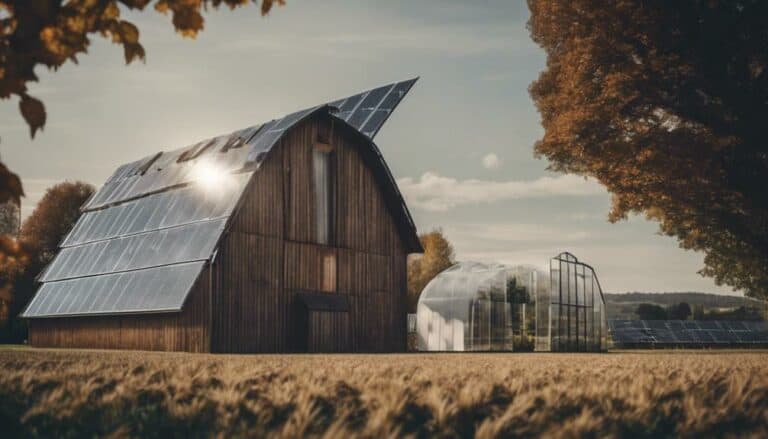To shift to modern farming techniques seamlessly, you must integrate traditional wisdom with cutting-edge technology. Blend time-tested practices like crop rotation with modern biotechnology to reduce pesticide use. Merge organic farming principles with digital platforms for enhanced data analysis. Enhance crop productivity by incorporating precision agriculture innovations like GPS and drones. Adopt sustainable practices such as water conservation and biodiversity preservation. Striking a balance between tradition and advancements is key. By combining old and new methods effectively, you optimize productivity, sustainability, and resource utilization in farming. This harmonious blend leads to innovative solutions for a thriving agricultural future.
Key Takeaways
- Integrate traditional farming wisdom like crop rotation with modern biotechnology for sustainable practices.
- Incorporate cutting-edge innovations such as precision agriculture and digital platforms for data-driven decisions.
- Combine old water management systems with modern irrigation technologies for efficient resource use.
- Merge traditional organic farming principles with modern tools like drones and smart sensors.
- Balance tradition and advancements to optimize resources and meet the demands of a growing population.
Integrating Traditional Wisdom With Modern Technology
By blending age-old agricultural practices with cutting-edge technological advancements, farmers can revolutionize their approach to farming and achieve unprecedented levels of efficiency and sustainability. Traditional farming wisdom, encompassing techniques like crop rotation and intercropping, plays an important role in enhancing soil fertility and pest control. Incorporating these methods with modern biotechnology allows for a reduction in the use of chemical pesticides, promoting a more environmentally friendly approach to agriculture.
Furthermore, combining traditional water management systems such as rainwater harvesting with modern irrigation technologies enables farmers to optimize water usage on their lands. This integration not only conserves water but also improves overall water efficiency, essential for sustainable farming practices. Additionally, merging traditional organic farming principles with modern digital platforms for data analytics empowers farmers to make informed decisions that maximize crop yields while maintaining ecological balance.
Enhancing Crop Productivity With Innovation
Incorporating cutting-edge innovations in precision agriculture has greatly enhanced crop productivity through optimized resource utilization and waste reduction. The integration of agricultural technology such as GPS and drones enables farmers to precisely monitor and manage their fields, leading to increased efficiency and higher yields.
Additionally, the adoption of biotechnology has revolutionized farming with genetically modified crops that exhibit traits like pest resistance and enhanced productivity, contributing immensely to overall agricultural output. Digital platforms and data analytics play a vital role in modern farming techniques by providing farmers with valuable insights for data-driven decision-making, resulting in more sustainable and efficient practices.
Advanced irrigation systems like drip irrigation and smart sensors facilitate targeted delivery of water and nutrients, promoting crop growth while conserving resources effectively. By embracing these innovative methods, farmers can optimize crop productivity, reduce waste, and ensure sustainable agricultural practices for the future.
Sustainable Agriculture Practices for the Future
To guarantee the future sustainability of agriculture, embracing practices that promote long-term productivity while mitigating negative environmental impacts is essential. Sustainable agriculture practices such as crop rotation, organic farming, water conservation, biodiversity preservation, and integrated pest management are key components in achieving this goal.
By focusing on soil health, reducing chemical inputs, and implementing agroforestry techniques, sustainable agriculture not only enhances agricultural production but also ensures long-term impacts on the environment are minimized.
These practices play an important role in enhancing food security and resilience to climate change. Crop rotation, for example, helps improve soil fertility and reduce pests and diseases, leading to increased yields over time. Organic farming methods promote biodiversity and reduce the reliance on synthetic pesticides and fertilizers. Water conservation techniques not only conserve this precious resource but also contribute to overall sustainability in agricultural production.
Balancing Tradition and Advancements in Farming
Embracing a harmonious blend of traditional wisdom and modern advancements, farmers are striking the delicate balance between heritage practices and cutting-edge technologies in today's agricultural landscape. The integration of modern technologies such as GPS, drones, and data analytics has revolutionized farming, allowing for precision practices that optimize resource use and increase efficiency. Moreover, the incorporation of biotechnology and genetic modification in crop production has greatly enhanced yields and improved resilience to pests and diseases, contributing to sustainable agriculture practices.
In this quest for balance, farmers aren't disregarding traditional knowledge but rather integrating it with innovative techniques to achieve a holistic approach to farming. By combining the time-tested practices of the past with the advancements of the present, farmers are able to optimize resource utilization, improve overall farm productivity, and ensure long-term sustainability. This strategic fusion of tradition and innovation is essential in navigating the complexities of modern agriculture while honoring the wisdom of the past.
Meeting Demands With Old and New Methods
Meeting the demands of a rapidly growing population necessitates the adept utilization of both traditional and modern farming methods to guarantee sustainable agricultural practices.
- Traditional farming methods, characterized by manual labor and small-scale operations, are complemented by modern techniques like advanced machinery and biotechnology.
- Integrating old and new methods in agriculture enables sustainable practices while addressing the needs of a growing population.
- Farmers are merging traditional knowledge with innovative technologies to optimize resource utilization and reduce environmental impact.
- Balancing traditional wisdom with cutting-edge solutions is essential in shifting to modern farming techniques, ensuring food security and agricultural sustainability.
Conclusion
In the harmonious dance between old and new, farmers are embracing innovative technologies while honoring traditional wisdom. The fields are alive with the vibrant hues of progress, as ancient practices intertwine with cutting-edge advancements.
This fusion of past and present propels agriculture into a sustainable future, where productivity flourishes and demands are met with efficiency. The rhythm of progress beats strong, as farmers navigate the ever-evolving landscape of modern farming techniques.

